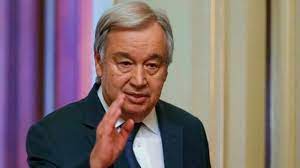The world is one step away from “nuclear destruction,” according to the head of the UN, and faces dangers unseen since the Cold War.
Regarding the conflict in Ukraine and other nuclear threats across the world, UN Secretary-General Antonio Guterres stated on Monday that “humanity is just one mistake, one error away from nuclear annihilation.”
The Nuclear Nonproliferation Treaty (NPT), which dates back decades and aims to eventually establish a nuclear-weapons-free world, was the topic of his remarks at the conference.
The pandemic-delayed summit, which attempts to review the historic accord, is taking place amid “nuclear peril not seen since the height of the Cold War,” Guterres stated in his opening remarks.
A chance to “hammer out the steps that will help avoid certain calamity, and to put humanity on a new route towards a future free of nuclear weapons,” he said, is presented by the meeting.
In addition, Guterres noted that “crises — with nuclear overtones — are festering from the Middle East and the Korean Peninsula,” adding that “the risks of proliferation are mounting and guardrails to prevent escalation are collapsing.”
Additionally, the United States (US), Japan, Germany, the UN nuclear head, and numerous other speakers brought up the possibility of a nuclear catastrophe.
Russia, which was due to speak at the conference but did not, according to US Secretary of State Antony Blinken, is “engaging in reckless, deadly nuclear saber-rattling” in Ukraine.
He quoted Russian President Vladimir Putin as saying that his nation is a “powerful nuclear power” and that any intervention in the conflict may have “consequences you have never seen.”
The forthcoming nuclear test by North Korea and Iran, which Blinken claimed were “unwilling or unable” to accept a plan to rejoin the 2015 nuclear accord intended to rein in its nuclear program, were both mentioned as threats by Blinken.
As the conference began, Putin appeared to back off from his earlier nuclear warnings.
In a greeting to NPT signatories published on his website on Monday, Russian President Vladimir Putin stated, “We think that a nuclear war cannot be won and must never be fought.” “We support indivisible, equal security for every member of the global community.”
The largest nuclear power station in Europe, the Ukrainian facility in Zaporizhzhya, is allegedly being used by Russia as a military base after being taken from Kyiv earlier in the conflict, according to Blinken.
“Knowing that they can’t and won’t shoot back because they might unintentionally strike a nuclear reactor or extremely hazardous garbage in storage,” he claimed of the Russian forces’ firing on Ukrainians from the location.
“This elevates the concept of a human shield to a completely new and horrible level.”
In a statement released on Monday night, the Russian delegation at the conference strongly refuted Blinken’s assertion, claiming that only a small portion of its staff was present at the power plant “to assure [its] safety and security.”
The International Atomic Energy Agency’s director general, Rafael Grossi, stated that the war in Ukraine is “so serious that the specter of a potential nuclear confrontation, or accident, has raised its terrible head once again.”
He urged all sides to allow an IAEA team of security specialists to visit the facility, which has been unsuccessful for the past two months, and warned that the situation in Zaporizhzhya was “getting riskier by the day.”
At the summit, Guterres urged attendees to take steps to avert a nuclear catastrophe.
These included working tirelessly toward the abolition of nuclear weapons with additional agreements to reduce arsenals. They also included immediately confirming and reinforcing “the 77-year-old rule against the use of nuclear weapons.”
He also urged world leaders to support the peaceful use of nuclear technology and address “the simmering tensions in the Middle East and Asia.”
He reminded diplomats, “Future generations are dependent on your willingness to step back from the brink.” “This is our chance to pass this crucial test and dispel the threat of nuclear destruction forever.”
The NPT, which has been in effect since 1970 and has 191 signatories, is one of the most extensively ratified arms control accords.
In accordance with its rules, the US, China, Russia (then the Soviet Union), Britain, and France, the five original nuclear powers, undertook to discuss the eventual elimination of their arsenals while other countries pledged not to acquire nuclear weapons in exchange for assurances they could develop nuclear energy for peaceful purposes.

















